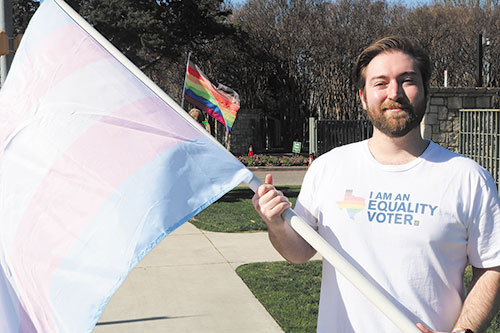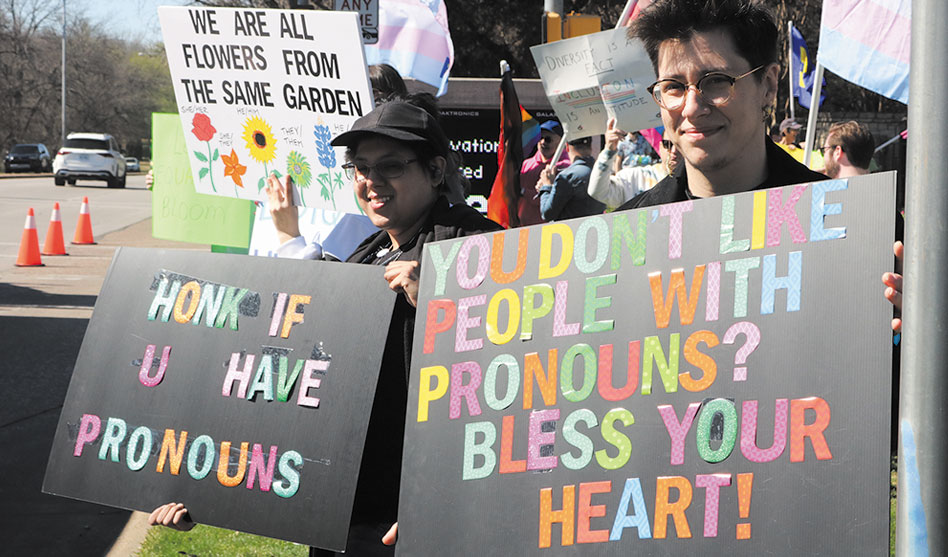Around 40 people participated in a March 19 protest outside Dallas Arboretum
(Dallas Taffet/Dallas Voice)
UT Southwestern, Children’s Health say they never closed their gender clinic.
DAVID TAFFET | Senior Staff Writer
taffet@dallasvoice.com
Allegedly after being threatened by Gov. Greg Abbott, Genecis Clinic at Children’s Health last November stopped taking new clients. This month the clinic’s founder filed a lawsuit against Children’s and UT Southwestern, which housed the clinic. But now officials with UT Southwestern and Children’s are saying it’s all a big misunderstanding.
On the other side of town, the Dallas Arboretum is taking the same position when it comes to allegations of employment discrimination there. A former employee’s claims they were fired for including pronouns in their email signature. while religious quotes continue to be allowed in email signatures seem to be part of a history of allegations of discrimination at the facility. That former employee has filed suit against the Arboretum.
The Quality of Life Committee of the Dallas City Council isn’t buying the “It was a mistake” claims. This week, the committee passed a resolution supporting the trans community and condemning the Texas Legislature for passing laws aimed at harming the trans community. The committee voted unanimously on Tuesday, March 29, to condemn an opinion from Attorney General Ken Paxton that calls providing gender-affirming care to trans youth child abuse. Gov. Greg Abbott then based his directive ordering the Department of Family and Protective Services to launch abuse investigations into parents providing access to such care for their trans children.
The Quality of Life Committee’s resolution now goes to the full council for a vote.
District 7 Councilman Adam Bazaldua chairs that committee. At a press conference announcing the resolution, Bazaldua condemned violence targeting the trans community and noted that eight of 66 hate crimes against trans people last year took place in Texas. And while the trans community faced violence on the streets, they also faced violence coming from the dome of the Texa Capitol as the Legislature considered 13 bills targeting the trans community for discrimination.
Deputy Mayor Chad West said of the resolution, “We took the step to tell the Legislature enough is enough.”
And Councilman Omar Narvaez described the Dallas trans community as vibrant, adding “We have their backs here in Dallas.”
Narvaez talked about children in loving homes being investigated for child abuse, pledging that loving families in Dallas will not be investigate for or charged with abuse. “Dallas is a welcoming city,” he said. “We will take care of them.”
As part of the resolution, city ordinances will be reviewed to make sure there’s specific language including gender identity.
Resource Center CEO Cece Cox thanked the three council members for their work. Noting that she wasn’t speaking for the trans community but as an ally to the trans community, Cox pointed out that “It’s not safe for many of our trans allies to speak out for themselves.”
Bazaldua acknowledged there was only so much support they can give on a local level, although at the county level, District Attorney John Creuzot said his office wouldn’t waste its time prosecuting parents for making life-saving medical decisions with their doctors for their children.
At the press conference, Cox also expressed her concern about the Arboretum case. She said if the allegations in the lawsuit prove to be true, the facility is violating city ordinances and the Dallas city charter.
Cox said she’s learned of additional cases of discrimination at the Arboretum that have resulted in lawsuits, but that employees and former employees speak of a culture of discrimination at the gardens that operate under contract with the city and sit on city park land.
Backpedaling over Genecis
 In a separate issue targeting the trans community, Genecis Clinic at Children’s Health had operated for almost a decade without controversy before last fall. As the Texas Republican primary approached and Abbott was being challenged from the right, he put pressure on UT Southwestern to close the gender-affirming clinic for trans youth.
In a separate issue targeting the trans community, Genecis Clinic at Children’s Health had operated for almost a decade without controversy before last fall. As the Texas Republican primary approached and Abbott was being challenged from the right, he put pressure on UT Southwestern to close the gender-affirming clinic for trans youth.
In a statement released by UT Southwestern and Children’s Health, the organizations wrote, “Last November, with legal challenges to hormone therapy as a component of care for minors treated for gender dysphoria gaining momentum in Texas and elsewhere, UT Southwestern and Children’s Health suspended initiating this treatment for new patients, believing that a failure to act would put the entire program in jeopardy.”
Their announcement at the time said nothing about “suspending,” but it was clear they were no longer taking new patients. Even existing patients worried that their treatment would suddenly end, although hospital officials’ statement did promise they would continue care for existing patients.
“In taking these actions, Children’s Health and UT Southwestern weighed the momentum of opposition to hormone therapy for gender dysphoria for minors — and efforts to curtail it — against the unquestioned need for our other gender-affirming care efforts and decided to focus on these important services,” the statement reads.
LGBT Caucus legislative intern Chesley Hinds looked into what was going on at Genecis and confirmed that “existing patients continue to have access to blockers/hormone therapies.”
“New patients,” she wrote in an email to LGBTQ organizations across the state, “are referred out to gender-affirming care providers listed in the attached doc [and] located in Houston, Austin [and] San Antonio (there are no referrals offered for providers in DFW).”
Two of the five providers UT Southwestern referred to — Texas Children’s Hospital in Houston and Legacy Community Health — have stopped offering blockers and hormone therapy to trans youth.
Hinds noted that UT Southwestern cites three reasons for discontinuing puberty blockers and hormone therapies for trans youth: media attention, political controversy and scientific controversy. While agreeing there has been plenty of media attention and the issue is politically controversial, she questions the claims of scientific controversy.
“Erroneous claims that there is uncertainty in the medical community about the long-term physiological and physical effects of these treatments on trans children,” she wrote, citing findings from UT Southwestern’s own published studies that support using blockers and hormone therapy on trans teens.
But the statement from UT Southwestern continues with more half-truths.
“Although Genecis served as a coordinating brand for our pediatric transgender services, contrary to what has been reported, it was never a stand-alone clinic,” the statement continues.
When Dallas Voice visited the clinic in its first year of operation, it was made clear that this was a stand-alone “program” and not some related handful of services presented under some catchy name. And it was presented that way to parents of trans youth, as well.
One mom said at the time she was “delighted with the Genecis program.”
The director of the program described three years of “putting the Genecis program together.”
Dallas Voice was not challenged by UT Southwestern on that description.
“To be clear: UT Southwestern physicians are currently providing gender-affirming care to both youths and adults,” the two organizations said in their statement this week.
“Our clinics for youths experiencing or needing evaluation for gender dysphoria were never closed and have been actively accepting new patients,” they also claim. “We continue to provide evaluations for gender dysphoria in youths, continue to provide psychiatric care for gender transition, and continue the coordination of these services.”
But UT Southwestern and Children’s Health won’t be providing the medication its own studies have shown are effective and life-saving treatments while referring patients to clinics hundreds of miles away that, in some cases, don’t provide the treatments either.













